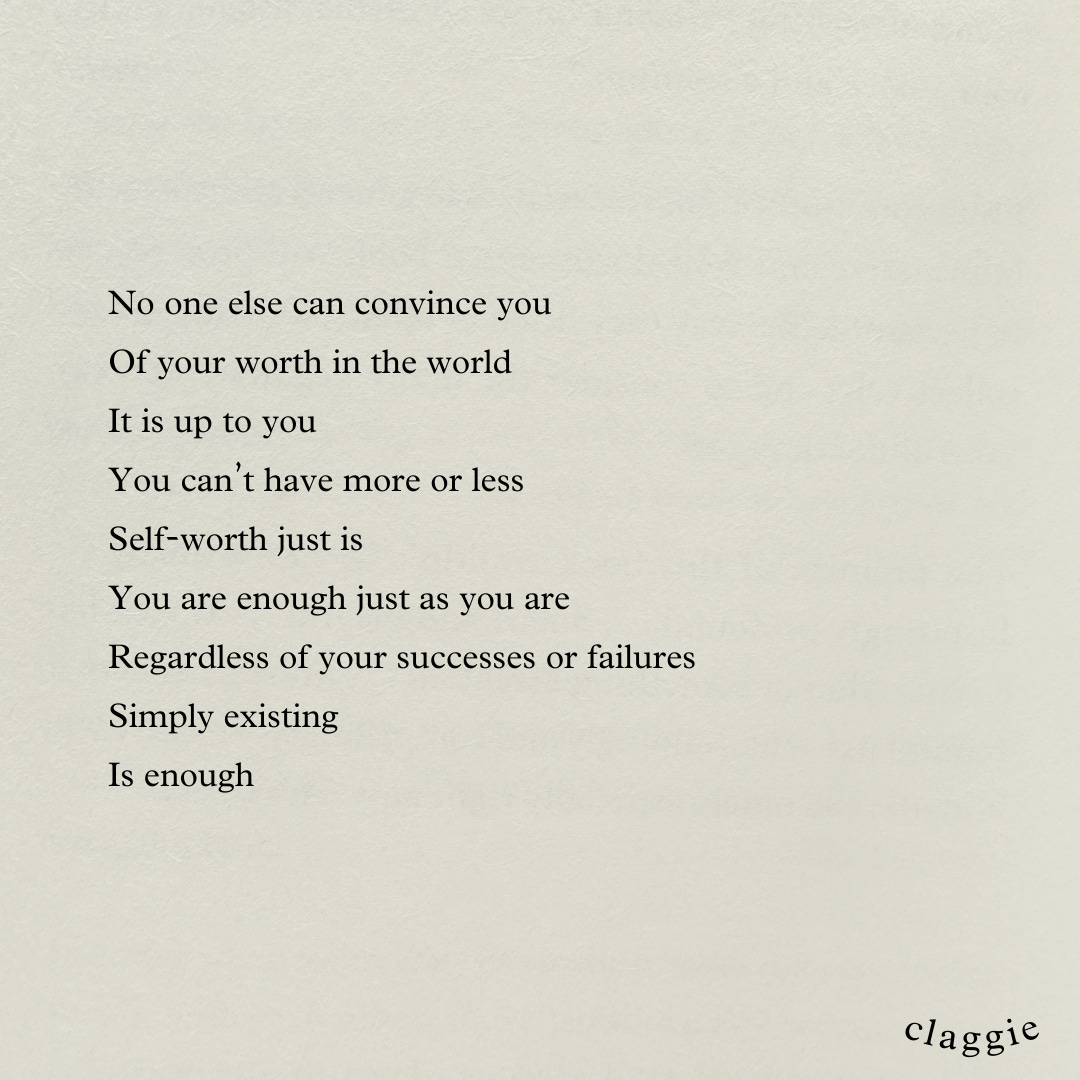What do you think about when you hear the term "self-worth?"
The concept of self-worth is one I hold close to my heart, having struggled with low self-worth and self-cricitism long before I knew how to name it.
As a kid, I was always worried, scared, and sensitive to changes of any kind. More often than not, my worries and fears left me feeling ashamed and guilty for being the way I was. If something was outside my comfort zone, I would try as hard as possible to avoid it. I remember taking swimming lessons, and on the last day, we were all allowed to jump off the high dive as a way to celebrate. I climbed up the ladder and instantly changed my mind when I saw how high I was. When I tried to turn around to climb back down the ladder, my instructor told me that jumping was the only way down and blocked the ladder. The nicer ending to this story would be for me to share that I overcame my fear, jumped in, and loved every second of it. Maybe the kids in line behind me even cheered me on… but this isn’t a nice story; it’s my story.
I sat down on the diving board until the instructor relented. I knew that the other kids were whispering about me, frustrated that I was keeping them from taking their turn (and rightfully so)! There was nothing anyone could do to get me to jump, so I sat, and I sat, and I sat. I remember it feeling like I was sitting there for an hour before I was finally allowed to climb back down.
This is just one of many stories where at the time, I felt so low about myself because I wasn’t able to do something simple like all of the other kids my age. What I’ve learned now is that not going off the high dive wasn’t actually a big deal, and it definitely didn’t make me less worthy than the other kids. I still haven’t climbed up to any high dive and jumped — and I still have no desire to. I have found things I love and enjoy and have faced many fears that felt right to overcome. I was bullied throughout my middle school years, and I remember thinking that I would never be enough. All I wanted was for the people who bullied me to like me! Now I have healthy relationships with people I love, and I can look back on little me and give that version of myself a big hug.
I’ve struggled with self-criticism and negative self-talk for most of my life, which also led me to stay in harmful relationships far longer than I should have. I honestly didn’t know there was another way to live until I started to learn more about self-worth, self-compassion, and other tools to move through feelings of inadequacy and life’s challenges.
For many of us, we are taught that our self-worth is tied to our successes and failures in our careers, relationships, and how “productive” we are. We attach our self-worth to the opinions of others, and nowadays, we even allow strangers on social media to be the judge of our worthiness. As soon as we fail or lose approval, we experience low self-worth. The good news: we’ve got it all wrong.
Self-worth is the internal sense of being good enough just as you are.
It doesn’t fluctuate based on success or failure. It’s a foundation that stays with you steadily through all of life’s circumstances (both good and bad). It isn’t conditional or determined by external factors like career, success or failure, relationships, age, or if you’re meeting societal expectations. We all deserve to take up space, be seen, and be heard.
A healthy sense of self-worth is unconditional and distinct from our productivity and accomplishments. Self-worth does not involve comparing ourselves to others or allowing others to decide if we are “enough.” It’s not something we can have more or less of—all humans deserve to be healthy, safe, loved, and supported.
Here are some reasons we link our self-worth to external factors – and struggle with low self-worth:
We often compare ourselves to others, especially in areas such as career achievements, wealth, appearance, and status. When we perceive others as more successful, we feel inadequate or lacking in comparison, even though all humans have their own sets of strengths, values, and imperfections.
Society, media, and pop culture often portray success in specific ways. These messages can create the belief that one’s value as a human being is tied to external achievements and recognition. Our own upbringing may have even taught us to criticize ourselves if we didn’t meet societal expectations.
Many of us seek validation and approval from others and don’t trust our own opinions and beliefs (especially about ourselves).
The fear of failure, rejection, and external criticism can drive individuals to pursue success as a means of proving our worthiness or avoiding negative judgments from others.
We may have experienced severe and ongoing trauma in our childhoods, which often leave us feeling like we don’t deserve to be seen, loved, or supported.
And lastly, many of us have a limited understanding of self-worth and equate it solely with external measures of success.
The differences between self-esteem, self-confidence, and self-worth:
Self-esteem is an individual’s subjective evaluation of their own worth based on external factors. It’s inherently fragile, bouncing up and down according to our latest successes and failures. Self-esteem involves comparing ourselves and even feeling better than others. It involves judgment, whether positive or negative.
Self-confidence specifically refers to the belief in one's own abilities, skills, and judgments, which fluctuates based on experiences. It is often built through practice, learning, and mastering new skills.
Unconditional self-worth is distinct from our abilities and accomplishments. It’s not about comparing ourselves to others; it’s not something we can have more or less of. It doesn’t fluctuate based on external factors – no judgment is involved. It offers more emotional stability than self-esteem because it’s always there for us – when we’re on top of the world and when we fall flat on our faces.
This is just the tip of the iceberg when it comes to self-worth, but I wanted to start this conversation and share a practice of mine with you. In this practice, you’ll start to learn how it feels to cultivate self-worth for yourself. Here is the practice, which is just under ten minutes:
I also created a short worksheet you can work through if you like to write (like I do).
Self-worth is one of the most common ideas I work on with my coaching clients to help them get unstuck from burnout and endless cycles of stress and self-criticism. If you struggle with being hard on yourself, you’re not alone. You are enough, and your life matters.
If you found this interesting and are curious about diving deeper and working with me 1-on-1, book a free consultation call. You can also click here to learn more about my coaching practice.
I’d love to hear from you if you have any thoughts about this topic or if you have suggestions for future topics I can write about here or share in my free bi-monthly Zoom sessions with Elise — so far, we’ve covered self-compassion and self-worth. I’d also love to know if you would enjoy deeper dives into these topics!




